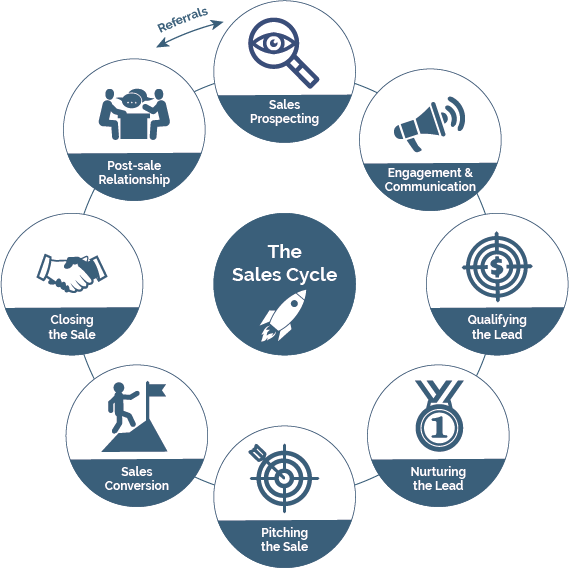How CRM Transforms Client and Prospect List Management
For many businesses, their world will revolve around sales, where customer relationships are paramount, a Customer Relationship Management (CRM) system emerges as a pivotal tool. This article explores the transformative power of CRM to unlock sales potential in managing and tracking client and prospect lists, shedding light on how this technology enhances organisation, communication, and overall efficiency in the sales process.
The adoption of CRM applications is not merely a trend but a strategic move with tangible benefits. Nucleus Research indicates that CRM applications hold the potential to elevate sales productivity by an impressive 34%. Furthermore, a survey conducted by Capterra reveals that a substantial 65% of businesses integrate CRM systems to not only fortify customer relationships but also to fuel increased sales.
What are the phases of a sales cycle?
The sales cycle, a fundamental process in the realm of sales and business, unfolds in distinct phases, each crucial for converting prospects into loyal clients.
Commencing with Sales Prospecting, businesses identify potential leads and prioritise them for engagement.
As the Engagement and Communication phase unfolds, personalised interactions build a foundation for relationships.
Qualifying the Lead involves assessing their viability, ensuring that resources are strategically directed.
Nurturing the Lead follows, where targeted campaigns based on preferences and historical interactions are employed.
The pivotal Pitching the Sale is crafted during the sales conversion phase, leveraging a comprehensive understanding of the lead’s journey.
The Sales Conversion phase uses gained knowledge to minimise and address objections and make simple Closing the Sale requires strategic finesse.

While Post-Sale Relationship building is equally crucial, fostering loyalty, encouraging repeat business and nurturing referrals. This cyclical process encapsulates the dynamic journey from prospect identification to long-term client satisfaction.
How does a CRM system revolutionise sales?
To understand the true impact of how a CRM can unlock sales potential, let’s delve into how this technology navigates key moments in the sales cycle, breathing life into the statistics:
Sales Prospecting
- CRM facilitates the seamless capture and organisation of potential leads.
- Integration with various data sources allows businesses to identify and prioritise prospects effectively.
Engagement and Communication
- Centralised client and prospect data enables comprehensive profiles, empowering sales teams to engage in personalised and meaningful conversations.
- Communication tracking features ensure that every touchpoint is logged, enhancing collaboration and avoiding duplication of efforts.
Qualifying the Lead
- CRM’s analytics capabilities enable Data-Driven Decision-Making, enabling real-time insights into prospect behaviors, preferences, and engagement patterns.
- Sales teams can make informed decisions, tailoring their strategies for maximum impact based on concrete data.
Nurturing the Lead
- Leveraging the data flow within the CRM, businesses can design targeted marketing campaigns.
- Understanding client preferences and historical interactions ensures that marketing efforts are not just efficient but also highly relevant.
Pitching the Sale
- CRM streamlines the sales process by providing a holistic view of each client’s journey.
- Sales teams can leverage this comprehensive understanding to guide prospects through the funnel, increasing the likelihood of successful conversions.
Sales Conversion
- With a detailed history of interactions readily available, CRM becomes the guiding force for sales conversion.
- Sales teams can leverage this comprehensive understanding to address objections and move leads through the final stages.
Closing the Sale
- CRM provides the necessary tools to efficiently close deals, ensuring that all required information and documents are in place.
- Sales teams can monitor progress, identify bottlenecks, and take corrective actions, ensuring a smoother closing process.
Post-Sale Relationship
- Beyond the sale, CRM continues to be a valuable asset in post-sales relationship building.
- With a history of interactions readily available, teams can nurture client relationships effectively, fostering loyalty and repeat business.
Modern CRM systems serve as more than just a glorified contact spreadsheet; they are dynamic tools propelling businesses through the nuances of the modern sales journey. By aligning with every stage of the sales cycle, your CRM not only maximises sales potential but also fosters enduring client relationships. It’s not merely about adopting technology; it’s about embracing a strategic ally that propels your business towards sustained success in the contemporary sales landscape.
How does a CRM solution actually do this?
To bring the significance of how a CRM can unlock sales potential to life, let’s look at a case study for Protecka, a growing safety training company. Faced with the challenge of managing a growing client base and a pool of prospects, they embraced a CRM solution to streamline their processes.
Implementing the CRM system allowed Protecka to centralise client and prospect data, fostering better company-wide organisation. The platform became a unified hub for crucial information, eliminating the inefficiencies associated with scattered data sources.
Communication within the team saw a remarkable improvement. With a shared platform, team members, and contractors alike, could easily access client histories, interactions, and preferences. This streamlined communication not only reduced redundancy but also ensured a consistent and personalised approach in every interaction.
Moreover, the CRM’s analytical capabilities empowered Protecka to tailor their marketing efforts with precision. By understanding client behaviours and preferences, targeted campaigns were launched, resulting in higher engagement and conversion rates. The CRM’s tracking features allowed the team to monitor the success of these campaigns in real-time, enabling swift adjustments for optimal results.

As a result of effective CRM utilisation, Protecka witnessed a significant uplift in sales opportunities. The platform’s ability to provide actionable insights and enhance collaboration played a pivotal role in converting prospects into satisfied customers. The entire sales process became more fluid and customer-centric.
How can a CRM unlock sales potential?
In conclusion, the opening statistics only scratch the surface of what CRM can truly accomplish. It’s not merely a tool but a dynamic force that propels businesses through every nuance of the sales journey. From prospect identification to post-sale relationship building, CRM is the linchpin that ensures sales teams operate at their optimal potential, driving success and fostering lasting client relationships.
The success of how Protecka used a CRM to unlock sales potential is a testament to the transformative impact of CRM on client and prospect list management. Beyond just a technological tool, a CRM becomes a strategic ally in navigating the complexities of modern sales. Through better organisation, enhanced communication, and targeted marketing, CRM is the key to unlocking the full sales potential of businesses.
Curious to explore the possibilities?
